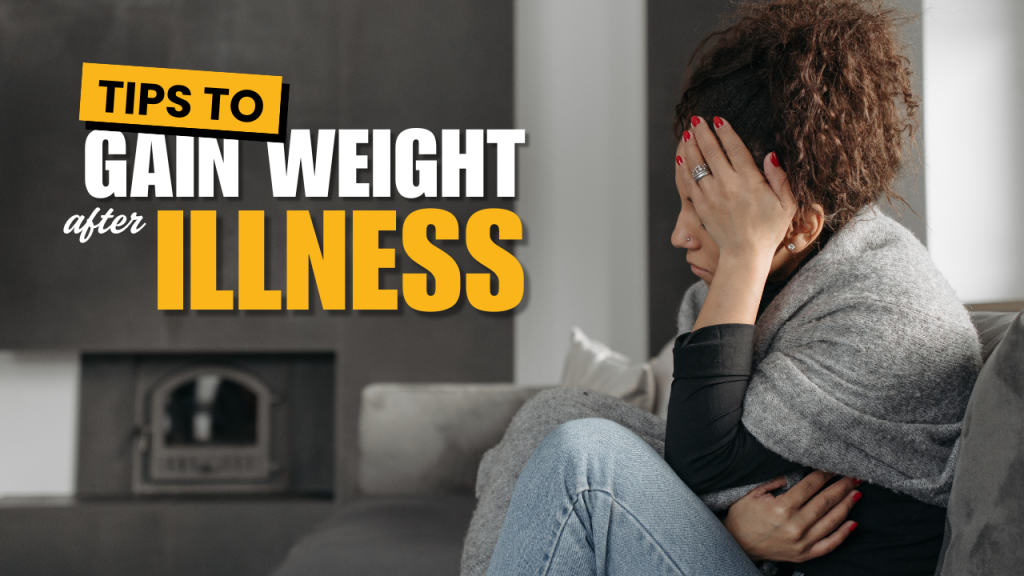Have you ever looked in the mirror after recovering from an illness and barely recognized yourself? You’re not alone. Whether it was a bout of flu, a viral infection, or a hospital stay, illness can strip the body of more than just energy — it often leads to unintentional weight loss, muscle depletion, and nutritional deficiencies.
Regaining lost weight isn’t just about eating more — it’s about rebuilding strength, replenishing nutrients, and supporting your body’s full recovery. In this guide, you’ll discover 7 evidence-based, practical, and safe ways to gain weight after illness, especially curated for long-term wellness.

Table of Contents
Do’s and Don’ts of Gaining Weight After Illness
| Do’s | Don’ts |
|---|---|
| Eat small, frequent, calorie-dense meals throughout the day | Skip meals or rely on large portions once or twice a day |
| Prioritize nutrient-rich foods (healthy fats, proteins, whole grains) | Eat mostly junk food or processed snacks for fast weight gain |
| Include protein in every meal to rebuild muscle | Neglect protein, which can slow down recovery and muscle repair |
| Stay hydrated with water, smoothies, and herbal teas | Drink sugary sodas or excessive caffeine that can hinder appetite |
| Add healthy snacks (nuts, seeds, cheese, dates) between meals | Snack on empty-calorie foods like chips or candy |
| Rest well and get quality sleep each night | Overexert your body too soon or ignore fatigue |
| Introduce light strength training or stretching | Do intense workouts without rebuilding strength first |
| Monitor progress and adjust your eating plan as needed | Obsess over weight numbers daily — focus on health first |
| Consult a doctor or dietitian for personalized advice | Self-medicate or follow extreme diets without professional guidance |
| Be patient — healing and healthy weight gain take time | Expect overnight results or give up too early |
30-Day Progress Snapshot: What to Expect
| Area | Expected Change After 30 Days |
|---|---|
| Body Weight | Gradual gain of 1–4 kg (2–8 lbs) depending on metabolism and calorie intake |
| Muscle Strength | Noticeable improvement in strength and endurance with light resistance training |
| Energy Levels | More stable energy throughout the day, reduced fatigue |
| Appetite | Increased hunger cues and better tolerance for larger meals |
| Digestion | Improved gut function, less bloating, better nutrient absorption |
| Mental Clarity | Reduced brain fog, better focus, and improved mood |
| Immunity | Stronger immune response and fewer lingering symptoms from illness |
| Sleep Quality | Deeper, more restorative sleep and easier wake-ups |
| Overall Confidence | Improved body image and emotional resilience |
| Health Foundation | Stronger base for long-term weight maintenance and illness prevention |
Why Does Illness Cause Weight Loss?
Before we jump into solutions, it’s important to understand the “why.” Illness-related weight loss often results from:
- Appetite loss
- Poor nutrient absorption
- Higher metabolic demand (due to fever or immune response)
- Muscle wasting from inactivity or bed rest
- Digestive issues (nausea, diarrhea, etc.)
Recovering properly requires a structured and gentle approach to nutrition and physical activity — not just high-calorie binging.
1. Prioritize Nutrient-Dense, Calorie-Rich Foods

Instead of filling up on empty calories, focus on whole foods that are high in both calories and nutrients. These help in rebuilding muscle, strengthening immunity, and improving gut health.
Examples:
- Healthy fats: Avocados, nuts, seeds, olive oil, and coconut milk
- Lean proteins: Chicken, fish, eggs, legumes, Greek yogurt
- Complex carbs: Brown rice, oats, sweet potatoes, whole-grain pasta
Tip: Add a tablespoon of nut butter or ghee to meals for an easy 100+ calorie boost.
2. Eat Small, Frequent Meals (Every 2-3 Hours)

A reduced appetite post-illness can make large meals overwhelming. Instead, eat 5–6 smaller meals throughout the day. This not only improves calorie intake but supports stable blood sugar and sustained energy.
Example Eating Schedule:
- 8 AM – Protein smoothie with banana & oats
- 10:30 AM – Handful of almonds & a boiled egg
- 1 PM – Rice, chicken curry & sautéed vegetables
- 4 PM – Greek yogurt with honey
- 7 PM – Salmon, mashed potatoes & steamed broccoli
- 9 PM – Milk with dates or a nut bar
3. Include High-Calorie Smoothies and Shakes

Liquid calories are less filling than solid foods, which makes them perfect for weight gain without feeling overly full. Plus, you can pack them with nutrients.
Sample High-Calorie Smoothie:
- 1 banana
- 1 tbsp peanut butter
- 1 cup full-fat milk or oat milk
- 1 scoop whey protein or Greek yogurt
- 1 tbsp honey
- 1 tbsp chia seeds
Blend it and get a 500–700 calorie meal in a glass!
4. Focus on Muscle Recovery with Protein and Resistance Training
Muscle loss is common during illness. Eating enough protein is key, but combining it with light resistance training (as approved by your doctor) boosts muscle protein synthesis and restores strength.
Best Sources of Protein:
- Eggs
- Chicken breast
- Tofu
- Cottage cheese
- Protein powders (whey or plant-based)
Start with bodyweight exercises like squats, wall push-ups, and resistance bands before moving to heavier workouts.
5. Optimize Gut Health for Better Absorption
If you’re eating enough but still not gaining weight, your gut may not be absorbing nutrients efficiently — especially after antibiotic use or gut infections.
Gut-Healing Foods:
- Probiotic-rich: Yogurt, kefir, kimchi, sauerkraut
- Prebiotic-rich: Garlic, onions, bananas, asparagus
- Bone broth for gut lining repair
Consider consulting a doctor about taking probiotics or digestive enzymes temporarily.
6. Stay Hydrated — But Not Before Meals
Hydration is crucial for recovery, but drinking large amounts of water right before or during meals can reduce appetite and stomach space.
Drink fluids 30–60 minutes before or after meals instead.
Include electrolyte-rich drinks if you’ve had vomiting, diarrhea, or fever.
7. Don’t Rush: Track Progress and Be Patient
Healthy weight gain is a slow and steady process. Gaining 0.5 to 1 kg (1–2 lbs) per week is ideal. Track your intake, energy levels, and body weight weekly, not daily.
Also, don’t neglect sleep and mental health — both are key in promoting appetite and tissue recovery.
Keep a journal to monitor:
- Weight changes
- Mood and appetite levels
- Symptoms (if any return)
- Food intake
- Energy and strength improvement
Bonus Tip: Consider Professional Support
If weight gain is very slow or challenging, consult:
- A registered dietitian for personalized meal plans
- A doctor to rule out lingering issues like thyroid problems or chronic infections
- A physiotherapist or trainer for safe physical activity after bed rest
Final Thoughts
Illness may take a toll on your body, but with the right nourishment, movement, and mindset, you can come back stronger and healthier than before. These 7 strategies are not just about weight gain — they’re about restoring your health at the cellular level.
Commit to healing from the inside out. Because your body deserves more than just survival — it deserves to thrive.
Frequently Asked Questions (FAQs)
How long does it take to gain weight after an illness?
It depends on the severity of the illness and your starting point. Most people can expect to gain 0.5 to 1 kg (1–2 lbs) per week with consistent calorie intake, rest, and light exercise. Patience is key — full recovery may take a few weeks to several months.
Can I just eat junk food to gain weight faster?
While junk food may help you gain weight quickly, it often leads to poor nutrient absorption, bloating, and fatigue. Healthy weight gain should come from whole, nourishing foods that also rebuild your immune system and muscles.
Is it normal to have a low appetite after recovering from illness?
Yes, it’s common for appetite to remain low for days or even weeks after recovery. Gradually introducing small, frequent meals and using appetite-stimulating ingredients like herbs (e.g., ginger, peppermint) can help.
Should I take supplements to gain weight faster?
If you’re struggling to meet your nutrient needs through food alone, supplements like protein powders, multivitamins, or probiotics may help. However, it’s best to consult a healthcare provider before starting any new supplement.
Can exercising help with weight gain after illness?
Yes — especially resistance or strength training. Exercise helps rebuild muscle mass and stimulates appetite. But start slow, especially if you’ve been bedridden or fatigued.





